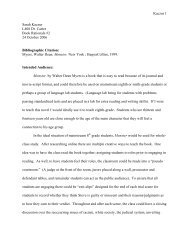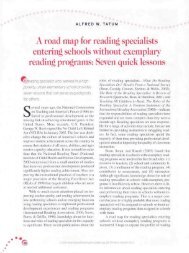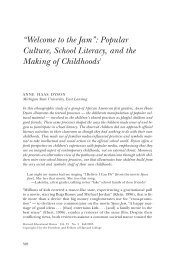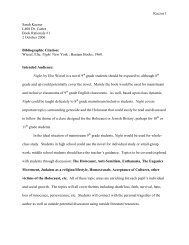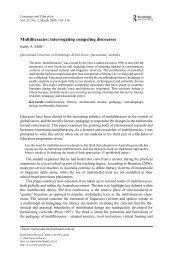feature Are You There God? It's Me, Manga - Oncourse
feature Are You There God? It's Me, Manga - Oncourse
feature Are You There God? It's Me, Manga - Oncourse
Create successful ePaper yourself
Turn your PDF publications into a flip-book with our unique Google optimized e-Paper software.
Goldstein and Phelanor as herself." <strong>There</strong> are members of theJapanese lesbian community who point toboys' love as an intluence during theiradolescence. One lesbian activist says thatshe "turned to these manga given the lackof representations of female-femaledesire." Akira Honma's Last Portraitcontains a poignant scene in which loversYamato and Sakaguchi pledge to give upeverything they have for each other: "Let'sgo away, we'll forget about society andfamily." The melodramatic genre of shojo isa perfect setting for expressing the plight ofbeing in a socially unacceptablerelationship. This is in accordance withMichael Cart's wishes for young adultliterature with gay protagonists: "Couldthese books perhaps play a positive didacticrole in acquainting young readers withrealistically portrayed gay and lesbiancharacters? And could those readers'imaginations be pushed a bit further to seesuch characters from an empathetic, ratherthan a sympathetic, perspective? Could ayoung reader not simply feel for gay andlesbian people but also with them?"*^Empathizing with homosexual charactersmay also lead to increased empathy withhomosexual couples in general. In Emura'sW Juliet, for example, Ito falls for Makoto,who must spend high school disguised as agirl to make his father take his wish to bean actor seriously. Ito and Makoto are astraight couple in the closet, and expressche same longing to have an open,legitimate relationship that undercover gaycouples may have: "In two years, we'll besunning ourselves on the beach. Somedaythe two of us." Boys' love can be a discreetway oi experimenting with a lesbianidentity through empathy for a malecouple, or by individually imagining theandrogynous couple as women. Like thewomen in drag of the Takarazuka revue,the pretty boys of boys' love permit readersto fantasize safely about same-sex feelings.Boys' love can engender an acceptancefor all feelings, between any combination ofsexes: "boys' love is a safe expression offeelings, period." The opportunity tonavigate a romance through a malecharacter's perspective gives female readerscf boys' love a chance to contemplaterelationships outside of the usual genderrole dichotomy, with the man as thepursuer and the women as the pursued. Itcan be liberating to see these proragonistsexhibiting the insecurities aboutrelationships normally associated withfemales. In Satoru Kannagi's Only the RingFinger Knows, Wataru and popular Yuichifind they are wearing the same rings bymistake. Embarrassingly, matching ringssignify a couple. Yuichi is cold to Wataru,and discomfits him. Wataru shivers andblushes, and Yuichi taunts: "What, did youthink I was gonna kiss you or something?"Maid Murakami's Gravitation tells thestory of Shuichi, an aspiring rock star, andEiri, an established romance author, andcontains humorous scenes in which the twomen struggle to come to terms with theirfeelings for each other. At one point, Eirideclares that he is straight, then leans in fora passionate, five-panel kiss with Shuichi,sending Shuichi into hysterics.In contrast to the frazzled malecharacters of boys' love, the femaleprotagonists are calmly confident in theirsexuality and desires. Occasionally theygive love advice to their male friends,making them aware of their repressedfeelings. In Last Portrait, Miyabi amiablytells her astonished fiance to leave herbecause she noticed that he hid hisengagement ring in front of her brother. InOnly the Ring Finger Knows, Wataru's sisterunnerves him when she mentions hisunacknowledged feelings for Yuichi. Sheteases his defensiveness: "Down boy, don'tget excited.. .<strong>You</strong>'re so easy to read!" Theunflappable females of boys' love steer theiremotional, less experienced male friendstowards the truth. Sanami Matoh's Fake, abestselling boys' love manga in the UnitedStates, tells the story of two New YorkCity police officers, Ryo and Dee, who feelan increasing attraction towards each other.In the fmal volume, Ryo is still strugglingto come to terms with his feelings for Dee.His friend Diana, a tough, resolute FBIagent, is much more open about sex andhomosexuality: "Oh stop it, Sandra Dee.<strong>You</strong>'re not in junior high. <strong>It's</strong> nothing toturn bright red about." She then tells him,"[you're] scared [to] have to face up toeverything you are." Ryo flimes, "What is itwith straight women, knowing everything agay guy thinks!"Occasionally boys' love fans appear inboys' love manga, and playfully objectifymen. In Satosumi Takaguchi's Shout OutLoud! female fans gush about their favoritevoice actors: "he does the best kisses!" InGravitation, Reiji falls in love with Shuichi.In spite of her unrequited love for him, sheenjoys his reconciliation with Eiri,admitting she has a "fetish" for "a prettyboylove scene." In boys' love, women sufferfrom none of the hesitation or prudishnessthat men do, and this is one way in whichthe genre "transgressively offer[s] readersnew models of masculinity and romance."'*'Women are assertive, certain of theirdesires, and ready to pursue men. In<strong>You</strong>ng-<strong>You</strong> Lee's Kill <strong>Me</strong>, Kiss <strong>Me</strong>, Tae Imclenches her fists, warning her crush: "Getready, Kun! Here I come!" Unliketraditional romances, in which the man isthe dominant pursuer, boys' love offersfemale readers a choice in relationshiproles. A Tokyopop editor observes that"[boys' love] breaks lots of culturalstereotypes about what relationships aresupposed to be. Women are expected toplay or serve a certain role. A [boys' love]reader doesn't have to associate with afemale character. <strong>You</strong> choose which oneyou identify with.""*^ Paul Gravett notesthat in the stories one male partner isusually more efïeminate and one is moredominant, and readers can choose toidentify more strongly with one role or theother. Brenner similarly observes,Summer 2009 j <strong>You</strong>ng Adult Library Services I YAL5 3 5





